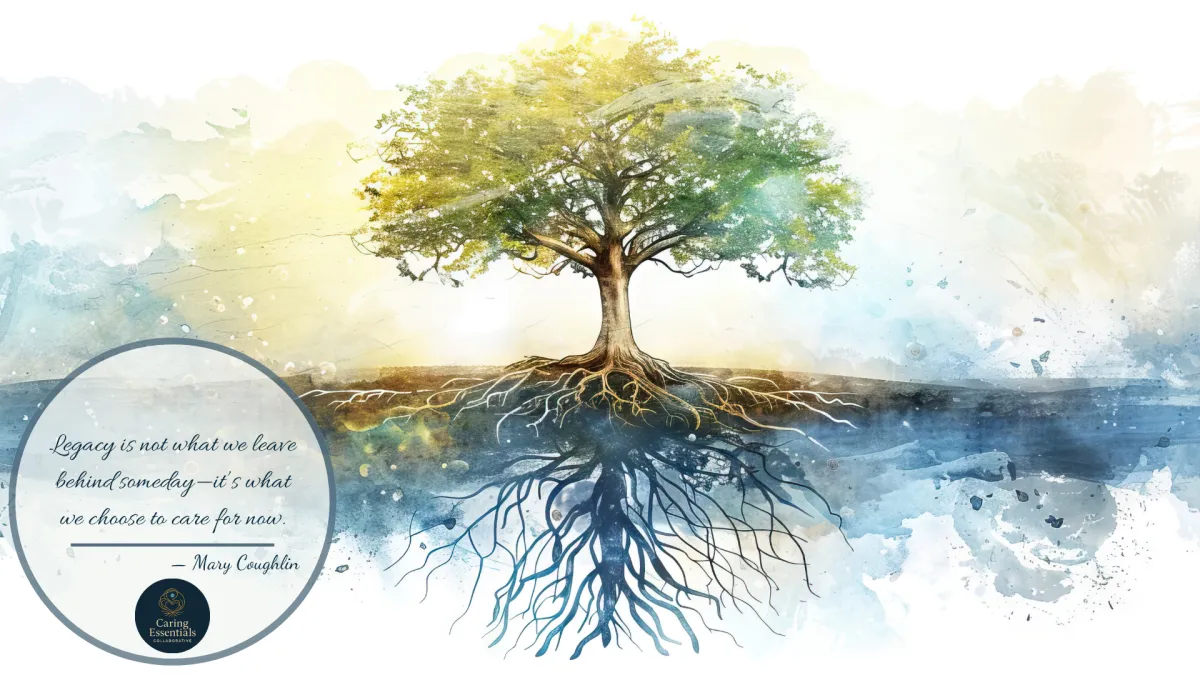
The Message and the Mandate: Weaving Legacy Through Care
"Legacy is not what we leave behind someday—it’s what we choose to care for now." - Mary Coughlin
The Message and the Mandate: Weaving Legacy Through Care
Reading The Message by Ta-Nehisi Coates, I am struck by its fierce, tender offering to Black youth—a letter threaded with memory, resistance, and love. Coates’s message is specific. It is shaped by the truth of being Black in America, and I receive it with reverence. I do not pretend to carry that same message, nor do I draw parallels to the experience he so powerfully honors.
And yet, something in the pulse of his words—his call to reckon with legacy, to resist dehumanization, to remember what we’re made of—resonates with my own work in trauma-informed developmental care.
What I carry is different, but perhaps adjacent: a mandate to protect the sacred beginnings of life, to care for those born into vulnerability, and to ensure that our systems do not forget the humanity at their core.
In the NICU, we are surrounded by origin stories. Every baby’s body carries the imprint of a thousand systems—biological, institutional, relational. And every clinician’s presence leaves a trace. That trace, whether soft or scarring, is legacy.
My work with Trauma-Informed Developmental Care (TIDC) and the B.U.F.F.E.R. framework has always been about reclaiming that trace. It’s about choosing to leave behind something different—something healing. It’s about interrupting cycles of harm, not just for babies, but for families, professionals, and ultimately, for systems.
Coates calls his message a gift of knowing, forged in pain and love. I feel a similar weight when I consider the legacies we shape in hospitals and care spaces. The power we hold. The care—or carelessness—we pass on.
B.U.F.F.E.R. as Living Legacy
The B.U.F.F.E.R. framework—Belonging, Understanding, Forgiveness, Frameworks, Equanimity, and Respect—is my attempt to name what true trauma-informed presence demands of us. These aren’t just ideals. They’re legacies in motion.
Each attribute is a thread:
Belonging says you are seen and held, not despite your vulnerability but because of it.
Understanding says I will meet you with curiosity, not judgment.
Forgiveness says healing is possible, even when harm has occurred.
Frameworks say you do not have to hold this alone.
Equanimity says we can face the storm without becoming it.
Respect says your dignity is non-negotiable, from your first breath forward.
This is how we write a different story—one grounded in care rather than coercion, in presence rather than performance.
TIDC as a Practice of Remembering
Trauma-Informed Developmental Care isn’t just about best practice. It’s about sacred practice. It is the work of remembering what it means to be human, especially when systems forget.
It says:
This baby is not a body to be managed, but a person becoming.
This family is not a disruption, but a source of healing.
This clinician is not a cog, but a soul with limits and longings.
TIDC teaches us to slow down, to attune, to listen to what is said—and what is silent. It is a practice of legacy because it insists: how we begin matters. And how we care becomes our inheritance.
The Legacy We Leave
Ta-Nehisi Coates writes with urgency because his message cannot wait. I feel that same urgency in the NICU. In hospitals. In a world increasingly numbed to suffering.
Legacy isn’t built later. It’s shaped now—in every moment of buffering, advocacy, and brave presence.
So I ask myself—and perhaps you will too:
What am I really leaving behind?
Am I reinforcing the old message of disconnection?
Or am I helping to write a new one—woven with belonging, buffering, and bold compassion?
We will not always be here. But our care will remain. Our trace will remain. And if we’re intentional, it will be a legacy of healing.
Because caring is essential. And legacy is lived now.
With care, with courage, and with every thread of the future we’re weaving—
Mary
P.S.: The trace you leave is not small. Whether at the bedside, in your leadership, or in your quiet resolve to do better—you are shaping legacy. Not later. Now.
Keep weaving. The future remembers.
JOIN THE MOVEMENT; BECOME A TRAUMA-INFORMED LEADER!
Footnote:
This post was inspired in part by The Message by Ta-Nehisi Coates—a profound letter to Black youth that speaks to the sacred weight of history, identity, and legacy. I honor the specificity of Coates’s lived experience and the cultural truth he brings to bear. My intention here is not to equate our messages but to reflect on how his call to remember and repair reverberates through many justice-oriented practices, including trauma-informed care. His words offer a compass for anyone committed to shaping a more human, more honest world.
